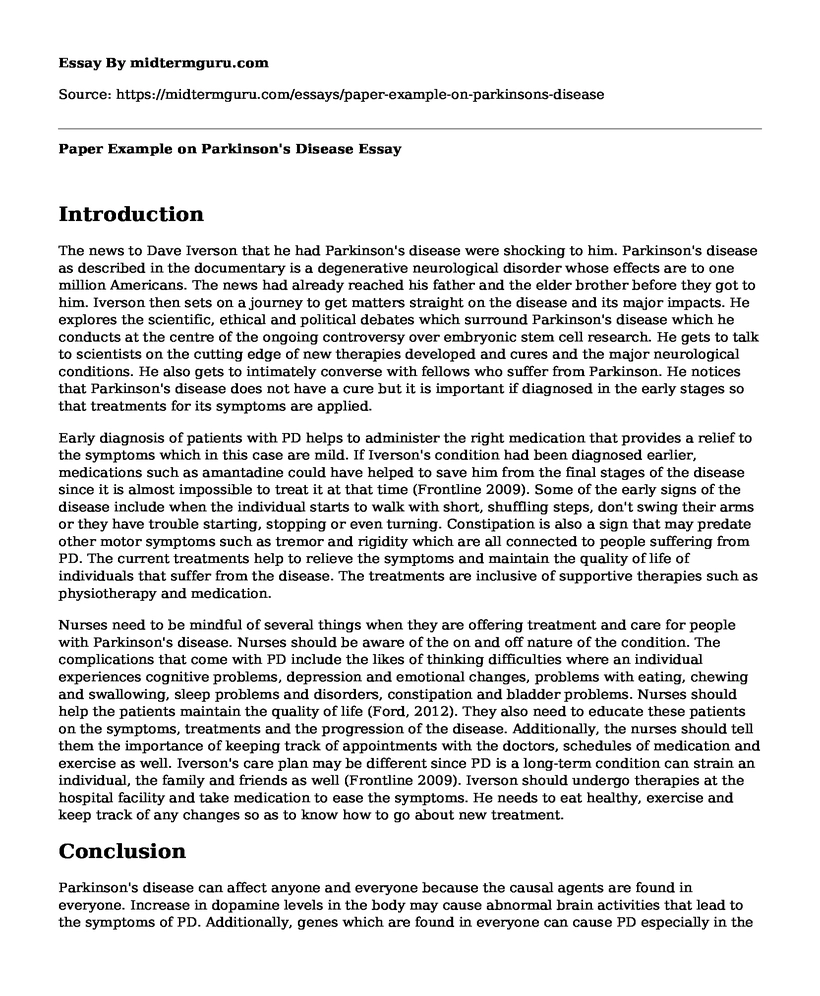Introduction
The news to Dave Iverson that he had Parkinson's disease were shocking to him. Parkinson's disease as described in the documentary is a degenerative neurological disorder whose effects are to one million Americans. The news had already reached his father and the elder brother before they got to him. Iverson then sets on a journey to get matters straight on the disease and its major impacts. He explores the scientific, ethical and political debates which surround Parkinson's disease which he conducts at the centre of the ongoing controversy over embryonic stem cell research. He gets to talk to scientists on the cutting edge of new therapies developed and cures and the major neurological conditions. He also gets to intimately converse with fellows who suffer from Parkinson. He notices that Parkinson's disease does not have a cure but it is important if diagnosed in the early stages so that treatments for its symptoms are applied.
Early diagnosis of patients with PD helps to administer the right medication that provides a relief to the symptoms which in this case are mild. If Iverson's condition had been diagnosed earlier, medications such as amantadine could have helped to save him from the final stages of the disease since it is almost impossible to treat it at that time (Frontline 2009). Some of the early signs of the disease include when the individual starts to walk with short, shuffling steps, don't swing their arms or they have trouble starting, stopping or even turning. Constipation is also a sign that may predate other motor symptoms such as tremor and rigidity which are all connected to people suffering from PD. The current treatments help to relieve the symptoms and maintain the quality of life of individuals that suffer from the disease. The treatments are inclusive of supportive therapies such as physiotherapy and medication.
Nurses need to be mindful of several things when they are offering treatment and care for people with Parkinson's disease. Nurses should be aware of the on and off nature of the condition. The complications that come with PD include the likes of thinking difficulties where an individual experiences cognitive problems, depression and emotional changes, problems with eating, chewing and swallowing, sleep problems and disorders, constipation and bladder problems. Nurses should help the patients maintain the quality of life (Ford, 2012). They also need to educate these patients on the symptoms, treatments and the progression of the disease. Additionally, the nurses should tell them the importance of keeping track of appointments with the doctors, schedules of medication and exercise as well. Iverson's care plan may be different since PD is a long-term condition can strain an individual, the family and friends as well (Frontline 2009). Iverson should undergo therapies at the hospital facility and take medication to ease the symptoms. He needs to eat healthy, exercise and keep track of any changes so as to know how to go about new treatment.
Conclusion
Parkinson's disease can affect anyone and everyone because the causal agents are found in everyone. Increase in dopamine levels in the body may cause abnormal brain activities that lead to the symptoms of PD. Additionally, genes which are found in everyone can cause PD especially in the cases of mutations. The older people are at a greater risk of getting the disease but it can also affect the young. This way, people need to prevent its occurrence by living healthy.
References
Frontline, (2009). My father, My brother and Me.
Ford, B. (2012). Pain in Parkinson's disease. In Parkinson's Disease (pp. 254-263). CRC Press.
Cite this page
Paper Example on Parkinson's Disease. (2022, Aug 29). Retrieved from https://midtermguru.com/essays/paper-example-on-parkinsons-disease
If you are the original author of this essay and no longer wish to have it published on the midtermguru.com website, please click below to request its removal:
- Role and Purpose of Clinical Supervision - Paper Example
- Characterization of a New Epidemic in Montana - Public Health Paper Example
- Paper Example on Food Record Analysis
- Paper Example on Ethical and Legal Dimensions of Euthanasia in Nursing
- Improving Health Status Through the Affordable Care Act - Essay Sample
- Coronary Artery Diseases: Risk of Venous Disorder - Essay Sample
- 1976 Ebola Outbreak in Central Africa: Yambuku Mission Hospital as Patient Zero - Essay Sample







